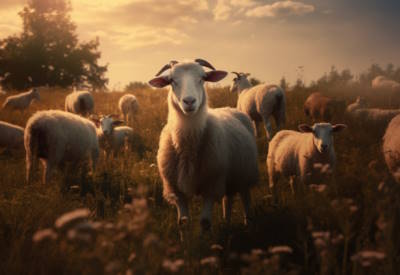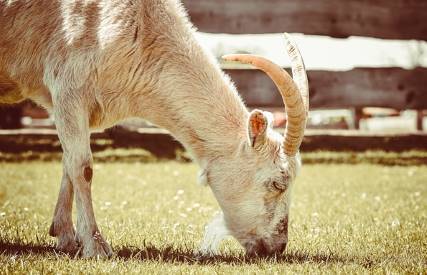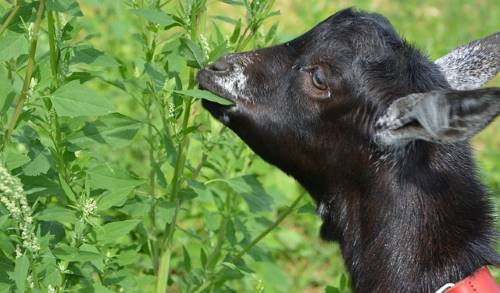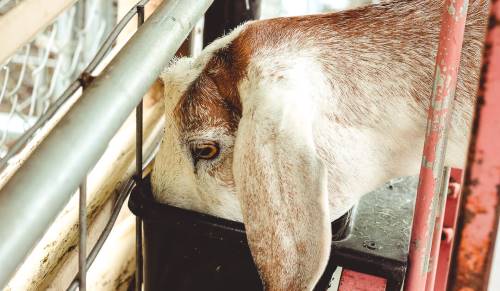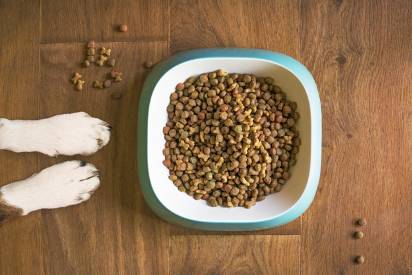Raising goats has always been a passion of mine, a journey filled with learning and endless moments of awe. It’s during this journey that the question often crossed my mind: can goats eat sheep feed? After much exploration, the answer is not as straightforward as one might think.
While on the surface goats and sheep might seem like close kin, with fluffy coats and a shared love for munching on greens, their dietary needs are as distinct as their personalities. Just as we humans need personalized diets catering to our unique needs, so do these ruminant cousins.
Embarking on this exploration, I found that understanding their feed is much like piecing together a puzzle. Each nutritional element plays a significant role in their health and well-being. Let’s delve deeper into this intricate tapestry of livestock nutrition.
Understanding the Basics of Livestock Feed
Diving into the world of livestock feed can sometimes feel like unraveling a knitted sweater. Everything is interconnected. Let’s begin by discussing the content of sheep feed and then explore how goats’ nutritional needs differ.
What is in sheep feed?
If you take a look at sheep feed, you’ll find a mixture of ingredients tailored to their specific needs. Often, it includes grains like barley or oats, sometimes soybeans for protein, and a variety of vitamins and minerals. These nutrients are all set in specific proportions to give sheep the right amount of energy, protein, and essential minerals.
How goat nutritional needs differ from sheep
While goats and sheep might seem similar in many aspects, they’re like two cousins with different food preferences. Goats, being curious explorers, need different nutrients, especially since they have a knack for climbing and jumping.
Their adventurous nature means they often require slightly more energy and specific nutrients, especially when it comes to minerals.
[GoatAffiliate]
Differences in Dietary Requirements
When you dine at a restaurant, you have different food preferences than the person next to you. Similarly, goats and sheep have varying dietary needs, even if they belong to the ruminant family. Let’s break down their dietary nuances.
Protein needs
Protein is like the building block of life for livestock. It aids growth, repairs body tissues, and is crucial for milk production. Sheep have their own protein needs, mostly for wool and meat production. Goats, on the other hand, might need more or less, especially dairy goats, which require protein for milk synthesis.
Mineral needs
Now, this is where things get particularly tricky. Copper, for instance, is essential for goats. It helps in various bodily functions. But for sheep? Too much copper can be detrimental. Always remember this golden rule when contemplating cross-feeding.
Energy and roughage
Both goats and sheep love to munch on their greens. However, their energy requirements differ, primarily because of their activities and physiological differences. Grains provide energy, while fibrous foods, like hay, are great for their digestion. Finding the right balance is the key.
Potential Health Issues from Inappropriate Feeding
They say, “You are what you eat.” While this adage primarily applies to humans, it isn’t too far off for our four-legged friends either. Feeding goats the wrong type of food, like sheep feed, can bring about various health concerns.
Digestive complications
Imagine eating something that your stomach isn’t quite fond of. It’s not a pleasant experience, right? The same goes for goats. Sheep feed might not be compatible with their digestive system, leading to issues like bloating, indigestion, or even more severe gastrointestinal problems.
Toxicity risks
Earlier, we discussed the potential danger of certain minerals, like copper. Over time, if a goat is fed a diet high in elements toxic to it, the symptoms will begin to manifest. These can range from mild stomach aches to severe health conditions that require immediate veterinary attention.
Benefits and Downsides of Cross-Feeding
While we’ve touched on the health implications, let’s address the elephant (or goat) in the room. Why might someone consider feeding their goats sheep feed in the first place? Let’s weigh the pros and cons.
Financial implications
Money talks, and sometimes, it says, “Hey, why not save a little by using the sheep feed for goats?” Yes, it might seem economical at first, but any health issues that arise from inappropriate feeding could rack up those vet bills, wiping out any initial savings.
Convenience in feeding
Having one feed for all animals sounds super convenient. No fuss, no mix-up. But, as with many shortcuts in life, the easiest path might not always be the best in the long run.
Best Practices for Feeding Goats
If there’s one thing to take away from all this, it’s that feeding your livestock properly is crucial. Let’s delve into some best practices when it comes to goat chow time.
Understanding label recommendations
Like humans reading nutrition facts on food packaging, understanding feed labels is paramount. These labels are there for a reason, guiding you on what’s inside and how it caters to your animal’s needs.
Alternatives to sheep feed for goats
If you’re adamant about mixing things up, consider blending feeds or adding specific supplements. This way, you can ensure that your goats are getting the right nutrients without the harmful extras.
Monitoring goat health
Lastly, always keep an eye on your goats. Regular check-ups, either by you or a vet, are essential. By monitoring their behavior, physical appearance, and overall demeanor, you can quickly spot if something’s amiss, be it due to their diet or any other reason.
What Other Animal Feeds Can Goats Eat Apart from Sheep Feed?
Every animal has its distinct dietary needs tailored to its physiology and lifestyle. While we’ve already discussed the potential issues with feeding goats sheep feed, one might wonder about other animal feeds out there. Are any of them safe or suitable for goats? Let’s dive into some common animal feeds and see if they fit the goat’s menu.
Chicken Feed
At first glance, chicken feed might seem harmless for goats. After all, it’s mostly grains, right? However, it’s formulated with specific nutrients for poultry, which doesn’t necessarily align with goats’ needs.
Moreover, certain types of chicken feed can contain medications or additives that aren’t safe for goats. While occasional nibbling might not cause immediate harm, it’s not recommended as a regular diet.
Read More: Can Goats Eat Chicken Feed: Why It’s Not A Good Idea
Dog Food
If you’ve got multiple pets, there’s a chance your goat could get into the dog’s stash. Dog food, be it kibble or wet food, is designed for carnivorous canines and is not suitable for herbivorous goats.
It contains meat products and other ingredients that aren’t part of a goat’s natural diet. Regular consumption can lead to digestive issues.
Read More: Can Goats Eat Dog Food: Why It’s Not A Good Idea
Horse Feed
Horse feed and goat feed might seem similar because they’re both designed for herbivores. While it’s true that many of the ingredients might overlap, horse feed is tailored to the energy and nutritional needs of horses.
Depending on the formulation, it might be richer in certain nutrients than what goats require. Occasional snacking might not be harmful, but it’s essential to ensure your goats get a diet designed for them.
Read More: Can Goats Eat Horse Feed? Simple Answer & Feeding Tips
Rabbit Food
Rabbit pellets are primarily made of hay, so they might appear to be a good fit for goats. While it’s true that they aren’t inherently harmful, rabbit food lacks the comprehensive nutrition that goats need.
If a goat occasionally munches on rabbit pellets, it shouldn’t be an issue, but it shouldn’t replace their main feed.
Read More: Can Goats Eat Rabbit Food? Simple Answer & Feeding Tips
Cat Food
Much like dog food, cat food is a no-go for goats. Cats are obligate carnivores, meaning their food is rich in proteins and fats derived from meat. This kind of diet is entirely inappropriate for goats and can lead to severe digestive problems if consumed regularly.
Read More: Can Goats Eat Cat Food? Unraveling The Barnyard Diet Mystery
Can goats eat sheep feed – final thoughts
So, circling back to our barnyard conundrum: can goats eat sheep feed? Well, while goats and sheep might be countryside pals, when it comes to dinner, they prefer their own plates. Just as you wouldn’t share your toothbrush with your neighbor, it’s best to keep their feeds separate, too.
In the grand grazing scheme of things, ensuring that each animal gets its specialized nutrition is like giving them their own customized buffet. A happy, well-fed goat isn’t just about a full belly; it’s about the right fill. So, next time you’re in the feed store, remember: one size doesn’t always fit all!
Related Articles:

